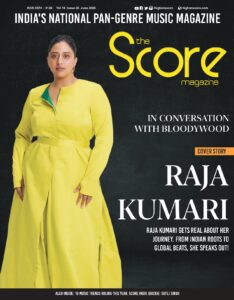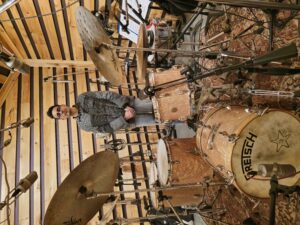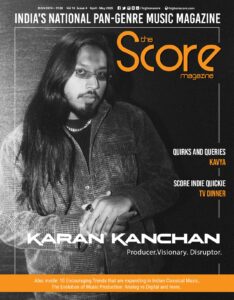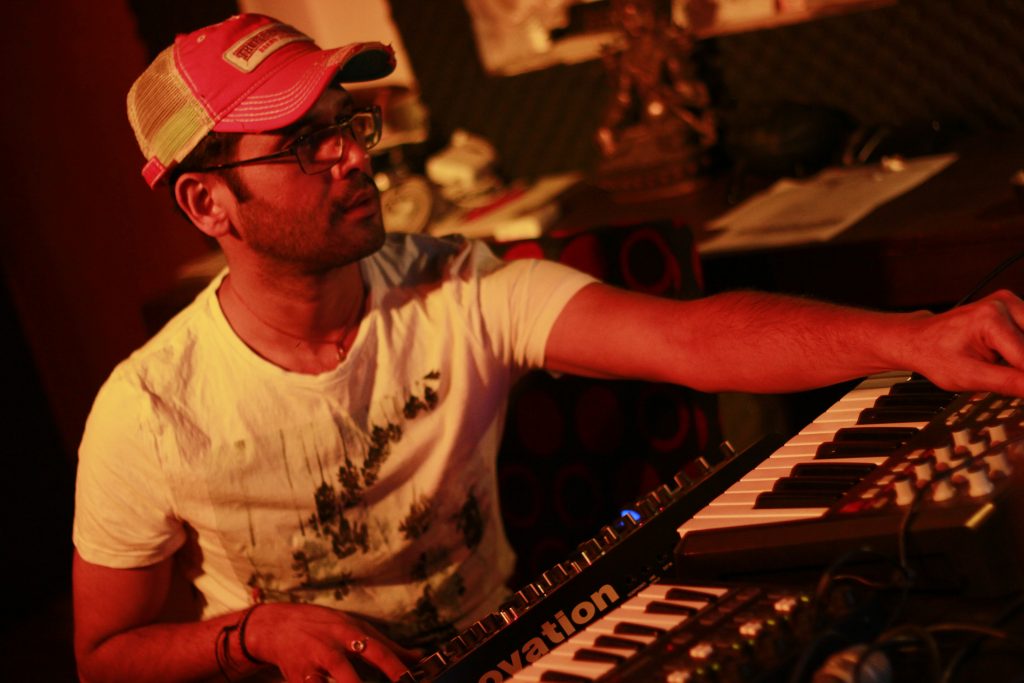One of the earliest trailblazers of electronic music in India, Rummy Sharma is no stranger to the country’s buzzing clubbing scene. If anything, he has contributed a decent amount towards, bringing state of the art international sounds from Europe to India since the 90s. Rummy today lives in Berlin, Germany with frequent visits to Delhi and other parts of India that his shows take him to.
In a freewheeling and hilarious chat with The Score Magazine, Rummy talks electronic music in India and more…
If one thinks back to the early 90s when electronic music was barely setting foot in India, a name such as Rummy Sharma would be hard to miss. More so for the party goers and initial converts to the electronica magic in the capital city of New Delhi.
Recognised as one of the oldest and most cherished of Delhi DJs, Rummy has played at some of the most cult clubs of the city and the world. He has been responsible for training a whole generation of DJs, for bringing world class artists to India along with introducing international bar chains such as Capitol, Orange and his very own Kuki.
And of course, working hard towards inculcating a taste of Techno and thereby other cousins of electronic with a series of curated gigs.
Rummy has several firsts to his credit and is often credited as the pioneer of Techno in India. He was also the first and the only Indian to have played at the prestigious Love Parade Festival in 2006 where he brought his own truck and played alongside Teisto, Pauk Van Dyk, Andre Nalin, Martin Eyerer, and several other world class DJs.
Rummy Sharma started his DJing career in 1992 but amidst his busy spinning schedules across the country and continents, it is now that he is finally concentrating on the producer in him. “It is a natural progression. It was always my dream to become a producer, however, for a long time; I didn’t have the bandwidth to do so as I was busy running my clubs. Production requires a lot of focus, concentration and time and it’s vital to do so internationally” he said.
But, is just dj-ing a viable profession in the long term? “I think just being a DJ can be a little limiting as a career move, not just in India, but anywhere. As a producer you control the creative process and you can create large scale projects that are international in scope, by working with diverse artistes. Production of good quality music is vital. India as such is not a very developed club market and is still many years behind the international scene, but I’m glad to see it evolve.”
But, back in the day, deejaying or producing music was not looked upon as a jolly task or even a much acceptable profession, says Rummy narrating the ordeal of his initial days. “I remember when I started djing in the early 90s rather 1991, hardly anybody knew about this profession in India. I was almost disowned by my family as they assumed that I work as a band master in some cheesy cabarets in Delhi.”
“You know, I would be stopped by the cops in the middle of the night who ask me about my profession, when I told them it confused them and how. They had no clue about what they should do with me, so eventually, they let me go,” he chuckles.
On a serious note he reckons, “It’s not necessary to spend lot of money on the equipment initially, but I would strongly recommend high quality training by a professional, for people who aspire to follow this profession in all seriousness”.
Cut to 2013 he shifted base to Berlin, Germany and has been winning accolades in the international Electronica circuit with several releases such as Wade in the Water with Iranian maestro Namito, among other tracks. The song had Rummy bringing great gospel vocals from a children choir from UK, combined with Namito’s studio skills. Over time he has shared the stage with the likes of Oliver Klein, Dimitri, DJ Rush, DJ Quicksilver, Grand Master Flash, Akon and Edward Maya, among others such as DJ Sven Vath, Dr. Motte, and Namito of course, who also happen to be his inspirations.
Of what seems like almost a decade of trying to work on expanding the audiences’ horizons in the country, Rummy recently released his single Meera, which embodies the coming together of his European and Indian sensibilities, while paying an ode to Krishna, targeted at the Indian market after a long hiatus, which was released internationally as a part of the much talked about ADE (Amsterdam Dance Event) 2016 compilation.
While Rummy certainly has Indian roots, his influences are absolutely connected to sounds of Berlin since early 90s. He is a lover of great Indian voices, melodies as well as heavy beats and one that feel that passion echoing through his track Meera.
The track has very modern tech house feel yet keeps the values of Indian Classical singing and gives us ear worm Melodic feel.
Meera has been sung Sachi Lalani, daughter of Rummy’s Close friend Kunal Lalani (from Mega group). “Sachi is a trained classical singer, I first heard her sing the popular folk song Chaap Tilak and that’s when I felt that her voice fitted my idea, perfectly. The track has been tested on many dance floors across the globe and has been well appreciated.”
Rummy has several laments and not the least a few accolades on the state of affairs of the Indian Electronic Music. The spurt in technology, he says, has been both been good and bad for the upcoming talent. “Advancement in technology has definitely helped .When I started djing there were only record players for djing and at that time specially in India there were no record shops where you could go and buy dance records of the shelf, so an enthusiast like me, would almost travel every week to places like Singapore or Berlin to pick up some records so that I could spin some latest stuff. With the advent of internet and digitization of DJ products/mixing software etc access to great music and inexpensive technology to be DJ/ producer, has encouraged loads of newcomers to enter this profession. Not only can you compose and mix more comfortably but the digitalization has given the producers an ability to well propagate and even release their music. Though I would not deny many massive idiots are also enjoying the fruits of it, he says with a hearty laugh.
Further adding to subject of this ‘charade of DJ/Producers’ he says, “But you know this is also the perfect time or unfortunately the only time where DJs with no experience can also make it big all you need to do is glam up your wardrobe, crack a mixing software, buy inexpensive toy controllers, pay money for your so called ‘Original Track’ to be featured in a Bollywood movie and done. I think it’s a perfect recipe for an idiot to a superstar.”
What would he say is his USP: “After 25 years of deejaying is I have the capacity and ability to play lot of old classics in the middle of my techno sets all over there world and that works really well. Can’t say how much the younger crowd appriciates it but mature audiences love it. I also don’t plan my sets I just go with the flow, I keep changing my style every 25 minutes or so.”
Although Rummy’s own specialisation –Techno hasn’t really captured the Indian audiences in a big way, he’s hopeful one day it will. “From 1994 to 2004-06 it was quite alright, lesser clubs, lesser people, lesser expectations, and more pure music. There weren’t as many fake projections as they are today, thanks to social media and people in were scene for the right reasons. But now everything is haywire, it’s less about the music and more about been seen, let’s say wannabe. With EDM and Bollywood taking main stage in two parallels it’s a slow and long journey, but I’m hopeful.”
His releases
Wade in the water – Rummy Sharma and Namito on Kling Klong records opened on no 6 DMC Charts and still doing great after over 3 years of release
Plexico EP – Rummy sharma on Blufin Records opened on No 1 position on DCC ( German Club charts )
Child In Time ( Deep Purple original classic track ) was remixed by rummy and released last year with opening chart position at No 4 on DCC
Future:
His new collaboration with German Techno Giant Lützenkirchen is next thing to look forward too .








